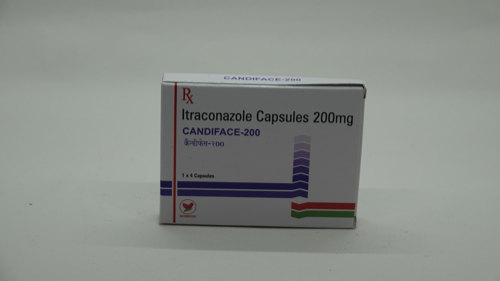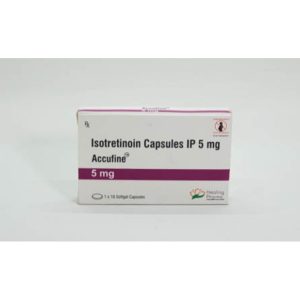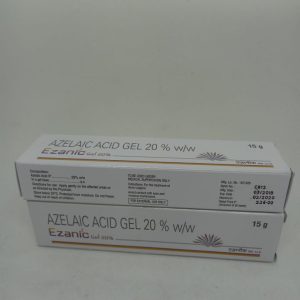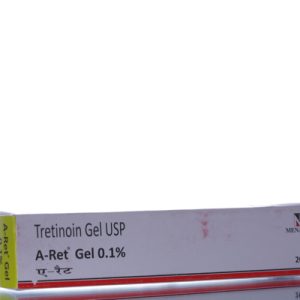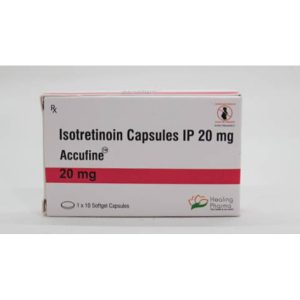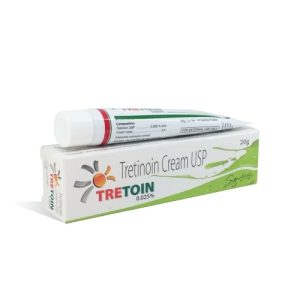Itraconazole (Candiface 200) 200 mg capsules is an antifungal that destroys the fungal cell membrane and acts to prevent the growth of fungi. It is used to treat diseases that are caused by fungi in various parts of the body. Each capsule contains 200 mg of Itraconazole as an active ingredient.
Drug = Itraconazole
Strength = 200 mg
How to take
Itraconazole is available in 3 preparations: tablet, capsule (conventional or pulse-release form) and oral solution.
It is taken right after a meal on a full stomach. Do not crush or chew. Take it at the same time daily if possible based on the doctors’ prescription. Do not take more than the prescribed dose.
Discontinue use if with adverse reactions or as directed by the doctor.
Dosage of Itraconazole (Candiface 200) 200 mg Capsules
Nail fungal infections:
Adult: As cap: 200 mg daily for a period of 12 weeks.
As pulse treatment: 200 mg twice daily for 1 week. For infections involving the fingers and toenails, may repeat with another 7 day cycle and 14 day cycle respectively. There should be a 21 day drug free interval between each treatment cycle.
Pityriasis Versicolor:
Adult: As cap: 200 mg once daily for seven days.
Primary or secondary prophylaxis of infections in neutropenic or AIDS patients:
Adult: 200 mg daily, may increase to 400mg in 2 divided doses if necessary.
Tinea corporis, Tinea cruris:
Adult: 100 mg daily for 15 days or 200 mg daily for seven days.
Oropharyngeal candidiasis:
Adult: 100 mg daily for 15 days.
Immunocompromised patients with HIV-AIDS, decreased white blood cell counts due to immunosuppression: 200 mg daily for 15 days.
Systemic fungal infections:
Adult: 100-200 mg daily, may be increased to 400 mg in two divided doses per day in cases of invasive or disseminated infections.
For life-threatening infections: a loading dose of 2 to 5mg/kg/day in three divided doses for a period of three days. Maintenance dose of 2 to 5mg/kg/day twice a day for 12 months
Tinea manuum, Tinea pedis:
Adult: 100 mg daily for 30 days.
Pulse treatment: 200 mg twice a day for seven days.
Vulvovaginal candidiasis:
Adult: 200 mg for 2 doses given in one day
Missed Dose of Itraconazole (Candiface 200) 200 mg Capsules
Take the tablet as soon as you remember. In some cases wherein the missed dose is taken several minutes before taking the daily dose, DO NOT take the additional capsule. NOTE that the prescribed timing must be followed at all times.
Continue taking the drug the next day as scheduled.
Do not double the dose under any circumstances
Overdose of Itraconazole (Candiface 200) 200 mg Capsules
If you think you may have used Itraconazole more than the usual dose, please seek medical help immediately.
Contraindications
People with the following medical conditions should not take Itraconazole:
- Hypersensitivity to itraconazole or any of its component
- History of congestive heart failure
- Pregnancy and lactation (except in life-threatening infections)
Side Effects of Itraconazole (Candiface 200) 200 mg Capsules
Taking Itraconazole may have any of the following unwanted side effects:
- Worsening of heart failure as manifested by increasing difficulty of breathing
- Abnormal collection of fluid in the lungs
- Hearing abnormalities (may be temporary or permanent)
- Allergic reaction
- Decreased white blood cell and platelet count
- Chest pain
- Rapid heart rate
- Ringing of the ears
- Changes in vision (blurring, doubling of vision)
- Gastrointestinal manifestations (nausea, abdominal pain, diarrhea, constipation, epigastric discomfort)
- Abnormal swelling of the lower extremities and the facial area
- Fever
- Yellowish discoloration of the skin, eyes and palms
- Itchiness
- Generalized body weakness
- Pain on the joints and muscles
- Headache
- Dizziness
- Difficulty of breathing
- Cough
Potentially Fatal side effects:
- Acute liver failure- very rare. Manifested as yellowish discoloration all over the body, elevated liver enzymes on laboratory examination and changes in sensorium.
Warnings
Do not take Itraconazole with any of the following medications:
- Antiepileptic drugs (Carbamazepine, phenobarbital, phenytoin)
- Antituberculosis drugs (Isoniazid, rifabutin, rifampicin)
- Antiretroviral drugs (Nevirapine, efavirenz, indinavir, ritonavir, telaprevir, saquinavir)
- Drugs that act to reduce gastric acid secretion (proton pump inhibitors, antacids, H2 receptor antagonists)
- Antibiotics (Erythromycin, Clarithromycin,Ciprofloxacin)
- Anti arrhythmic drugs (Digoxin, verapamil)
- Antihistamines (Bilastine)
- Drugs that prevent anxiety attacks ( midazolam,alprazolam,buspirone)
- Drugs that lower blood sugar levels (repaglinide)
- Analgesics (meloxicam,oxycodone)
- Drugs that prevent erectile dysfunction(bosentan,sildenafil,tadalafil)
- Drugs that prevent blood clot formation (apixaban, coumadin,cilostazol)
Potentially Fatal combination:
- Astemizole
- Bepridil
- Cisapride
- Disopyramide
- Dofetilide
- Dronedarone
- Felodipine
- Halofantrine
- Lercanidipine
- Levacetylmethadol
- Mizolastine
- Nisoldipine
- Pimozide
- Quinidine
- Sertindole
- Terfenadine
- Dihydroergotamine
- Ergometrine
- Simvastatin
- Lovastatin
- Triazolam
- Midazolam (oral)
- Lurasidone
- Irinotecan
- Eplerenone
- Ranolazine
- Colchicine
Always notify your doctor and pharmacist if you are taking any other medicines, including herbal tonics such as traditional Chinese medicine, supplements and medicines that you buy without a prescription.
This list does not include all medicines that may interact with Itraconazole.
How Does It Work?
Itraconazole inhibits the cytochrome P-450 enzyme and ergosterol biosynthesis is reduced, resulting in the fungus being unable to build a cell membrane to protect itself. Ergosterol is an important component of the fungal cell membrane and its deficiency will allow the drug to cross freely and exert its effect by causing cellular permeability to increase.
Uses
Itraconazole is used to treat the following conditions:
- Esophageal candidiasis
- Oral candidiasis
- Prophylaxis of fungal infections in immunocompromised patients
- Oropharyngeal candidiasis
- Vulvovaginal candidiasis
- Pityriasis Versicolor
- Tinea corporis
- Tinea cruris
- Nail fungal infections
- Systemic fungal infections
- Prophylaxis of infections in neutropenic or AIDS patients
Special Precautions and Warnings
Take special precautions if you have the following conditions:
- Ischemic or valvular disease
- Edematous disorders
- Renal failure
- Chronic obstructive pulmonary disease (COPD)
- Achlorhydria
- Immediate life-threatening systemic fungal infections
- Cystic fibrosis
- Neutropenic
- Acquired immunodeficiency syndrome (AIDS)
- Organ transplant patients
- Renal and hepatic impairment
- Elderly
- Pregnancy (life-threatening infection)
- Lactation
Storage Conditions
- Cap, tab: Store between 15-25°C and protected from light and moisture.
- Store in a cool, dry place away from the reach of children.
- Do not use Itraconazole that is expired or out of date.

